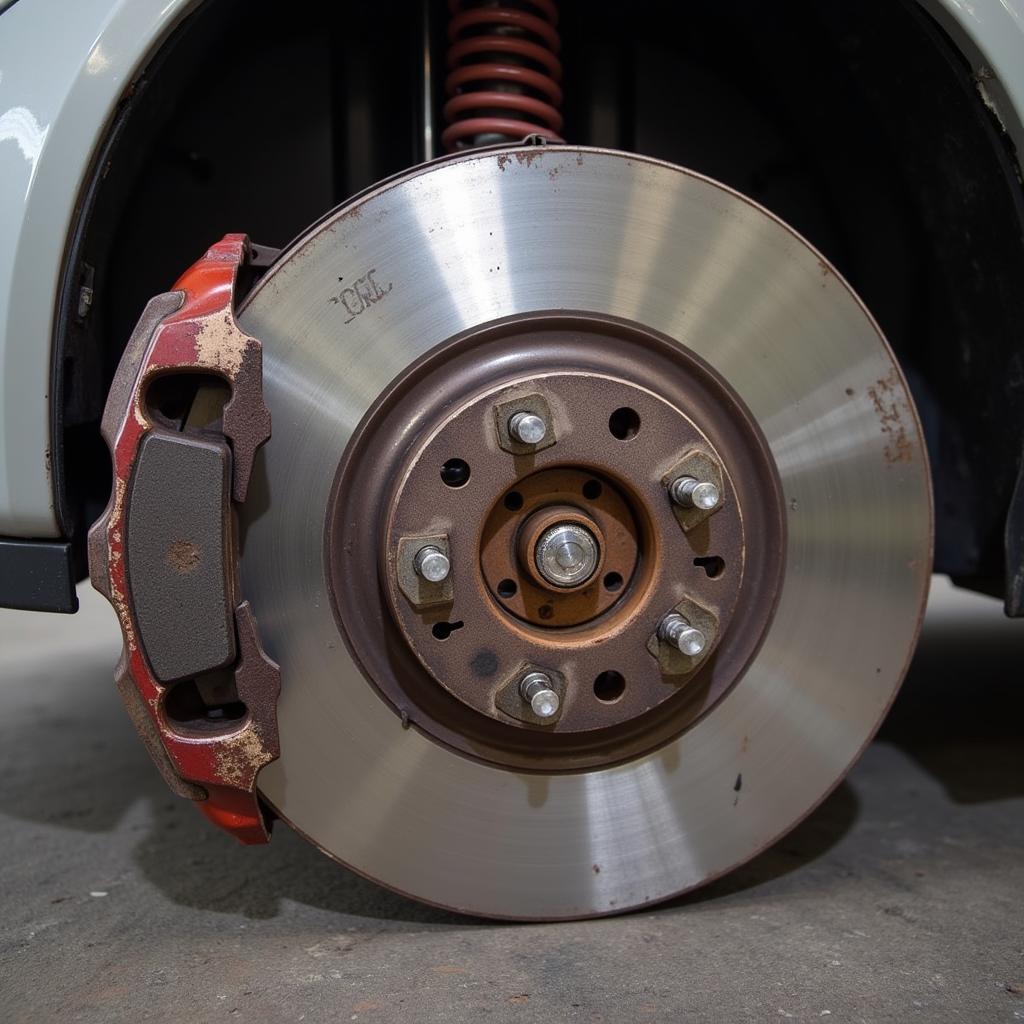A flickering brake warning light on your dashboard can be a nerve-wracking experience. Understanding the causes of flickering brake warning light is crucial for maintaining your vehicle’s safety and preventing potential accidents. This article delves into the various reasons why your brake warning light might be flickering, from simple fixes to more complex issues. We’ll guide you through troubleshooting steps and help you understand when professional intervention is necessary.
Low Brake Fluid: One of the most common causes of a flickering brake warning light is low brake fluid. Your brake system relies on hydraulic pressure to function correctly. When the brake fluid level drops, the pressure fluctuates, causing the warning light to flicker. This could be due to a leak in the brake lines, worn brake pads, or a failing master cylinder. Check your brake fluid reservoir and top it off if necessary. If the light continues to flicker, you likely have a leak that needs immediate attention. You might want to know what is a good anti theft device for a car?
Why is My Brake Light Flickering Intermittently?
Intermittent flickering often points to a loose or faulty connection in the wiring harness connected to the brake system. Vibrations while driving can cause the connection to break momentarily, leading to the flickering. Inspect the wiring for any signs of damage, corrosion, or loose connections.
 Worn Brake Pads and Flickering Brake Light
Worn Brake Pads and Flickering Brake Light
Worn Brake Pads: How They Contribute to a Flickering Brake Light
Another frequent culprit is worn brake pads. Many vehicles have a sensor embedded in the brake pads that triggers the warning light when the pads reach a certain level of wear. If this sensor is malfunctioning or the pads are excessively worn, the light might flicker.
Could a Faulty ABS System Cause a Flickering Brake Light?
A malfunctioning Anti-lock Braking System (ABS) can also cause a flickering brake light. The ABS prevents wheel lockup during hard braking, and a problem with the system’s sensors, pump, or control module can trigger the warning light. Diagnosing ABS issues often requires specialized diagnostic tools.
Diagnosing ABS-Related Issues
Diagnosing ABS issues can be complex, often requiring scanning the vehicle’s computer for fault codes. A qualified technician with access to diagnostic software can pinpoint the problem and recommend the necessary repairs. Sometimes, a simple ABS sensor cleaning or replacement might resolve the issue.
What About Issues With the Brake Light Switch?
The brake light switch, located near the brake pedal, activates the brake lights when the pedal is pressed. A faulty switch can cause various issues, including a flickering brake warning light, as the signal to the system becomes erratic. Testing and replacing the brake light switch is usually a straightforward procedure.
Troubleshooting a Flickering Brake Warning Light: A Step-by-Step Guide
-
Check the brake fluid level. If it’s low, top it off and monitor the light. Persistent flickering indicates a leak.
-
Inspect the brake pads. If they’re worn, replace them. A qualified technician should also check the brake pad wear sensor. You might consider what are anti theft devices.
-
Examine the wiring harness. Look for damage, corrosion, or loose connections. Repair or replace any faulty wiring. Are you looking for the best bluetooth car radio 2019?
-
Have the ABS system checked. A professional technician can diagnose ABS-related issues using diagnostic tools. They can also advise if does anti-theft steering column lock count as security system.
-
Test the brake light switch. A faulty switch can cause erratic signals. Replacing the switch is a relatively simple fix. Have you checked if does shopko use anti theft on toys?
“Ignoring a flickering brake warning light is like ignoring a ticking time bomb,” says automotive expert, David Miller, ASE Certified Master Technician. “Addressing the issue promptly can prevent costly repairs and ensure your safety on the road.” Another expert, Sarah Johnson, a seasoned automotive electrical specialist, adds, “Modern cars are complex, and a simple flickering light can indicate a deeper issue. Don’t hesitate to seek professional help when needed.”
In conclusion, understanding the causes of flickering brake warning light is vital for safe driving. Addressing the underlying issue promptly can prevent further damage and ensure your safety. Don’t ignore this important warning sign – take action now.
FAQ
-
Can I drive with a flickering brake light? While it might be possible to drive short distances, it’s highly recommended to get the issue diagnosed and resolved immediately.
-
Is it expensive to fix a flickering brake light? The cost depends on the underlying cause. Simple fixes like low brake fluid or a faulty switch are relatively inexpensive, while ABS repairs can be more costly.
-
How can I prevent my brake warning light from flickering? Regular maintenance, including brake fluid checks and timely brake pad replacements, can help prevent flickering.
-
What should I do if my brake light is constantly on? This usually indicates a serious issue with the braking system and requires immediate attention.
-
Can I check the brake fluid level myself? Yes, locate the brake fluid reservoir under the hood and check the fluid level against the markings.
-
How often should I check my brake fluid? It’s a good practice to check your brake fluid level at least once a month.
-
Is it safe to top off brake fluid myself? Yes, but ensure you use the correct type of brake fluid specified in your owner’s manual.


